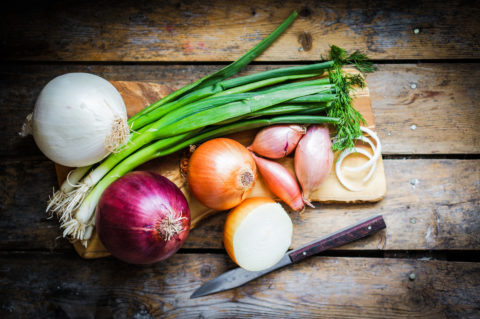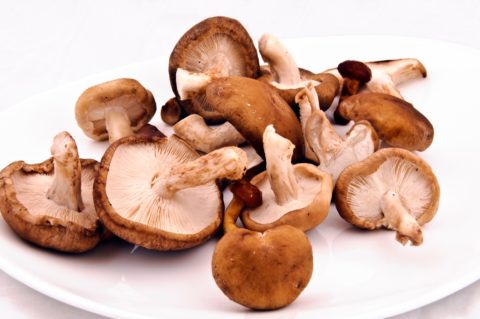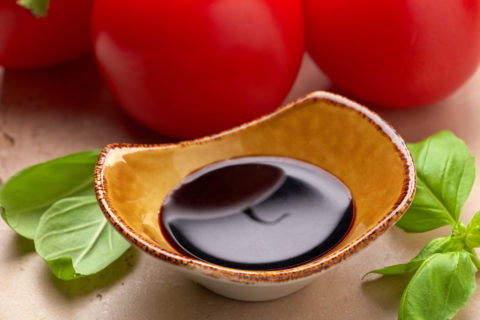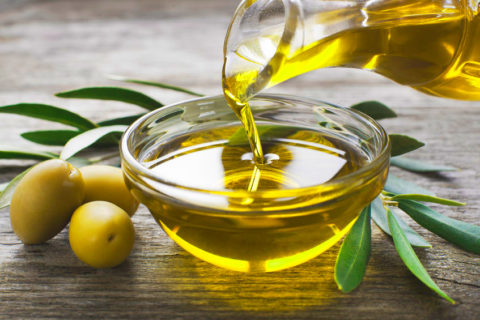By Stephen T. Sinatra, M.D., F.A.C.C., F.A.C.N., C.N.S., C.B.T.
You’ve probably heard the word “superfood” being thrown around by nutritionists and food bloggers, maybe even some doctors. Heck – I’ve used it for years to describe my top healthy foods!
As far as I’m concerned, if giving superhero status to foods like kale or acai convinces more people to try such nutrient-dense fuel, I’m all for it! The problem with a lot of foods deemed “super,” however, is that they are an acquired taste. Spirulina, chlorella, wheatgrass, liver… all could be called superfoods, but they’re not exactly what I’d call super popular.
In reality though, superfoods don’t have to be fancy or exotic. There are plenty of common foods that I would consider “super” due to their nutrient profiles, and they actually taste good!
Among other healthy foods like beets and avocado, here are five that I recommend adding to your diet, if you don’t already eat them…

Allium Vegetables
You may not know the term allium, but chances are you eat this family of vegetables pretty often without even realizing it. The alliums include onions, garlic, scallions, shallots, leeks, and chives.
Alliums contain an enzyme called alliinase, which you can thank for the pungent aromas that are so characteristic of these foods. Take garlic. When you chop or mince it, sulfur compounds called alliins combine with alliinase. This triggers a chemical reaction that leads to the distinctive smell. This is actually a mechanism meant to protect the plant by repelling pests! In humans, though, these compounds provide impressive health benefits.
Alliums boast a number of beneficial phytonutrients, including quercetin, ferulic acid, anthocyanins (in red or purple alliums), chlorophyll (in green alliums), and myricetin and apigenin (in garlic).
What this means for you is cardiovascular protection (especially cholesterol and blood pressure management), reduced risk of various cancers, and decreased inflammation throughout the body—which lowers risk of many different inflammatory conditions.
Garlic in particular also confers antibacterial and antiviral properties. Because it is a natural antibiotic, garlic is sometimes referred to as “Russian Penicillin.” For many years, Russian physicians used garlic to treat respiratory diseases, and the Russian army continued to use garlic medicinally during World War II, even when penicillin was already in use. Ancient Greeks and Israelis used garlic as parasitic treatment, and it was even used in France as a preventative during the “Spanish fever” pandemic of influenza in 1918. Most recently, a 2020 study concluded that garlic may help prevent COVID-19 infection by not only boosting immune system cells but inhibiting the production of pro-inflammatory compounds.1 ,2
Balsamic Vinegar
Not only is balsamic vinegar delicious, it boasts many benefits when it comes to blood sugar control, heart health, weight management, and more.
While all vinegars offer these benefits, balsamic contains a little more acetic acid than distilled or apple cider vinegars. Acetic acid is a powerful antimicrobial.
Balsamic vinegar is great for people with diabetes, as it lowers postprandial (post-meal) blood sugar levels. It also contains strains of probiotics that aid with digestion and also provide a feeling of satiety, helping you feel fuller for longer periods of time, which keeps you from overeating.
Along with acetic acid, balsamic vinegar is rich in polyphenols and flavonoids, which help lower risk of hypertension and heart disease by preventing oxidative damage to arteries.
Two tablespoons a day is all you need. More may contribute to stomach upset. An easy way to ensure you get this amount every day is to make homemade salad dressings with olive oil and balsamic vinegar, then drizzle on top of salads, vegetables, and cooked meats. What a great incentive to eat more leafy greens!
More on balsamic vinegar and vinaigrette recipes here.
Eggs
Few foods have been as vilified as the egg. It’s a shame because eggs are as close to the perfect food as you can get!
The reason eggs got such a bad rap for so long is because they are fairly high in dietary cholesterol, which for decades was blamed for the rise in heart disease. But, thankfully, this longstanding (and totally false) belief has finally been put to rest.
Sadly, with all of this focus on cholesterol, most people don’t even realize that eggs are jam-packed with vitamins, protein, and healthy fat. The egg white is all protein—and an excellent source if you’re looking to up your protein intake. The yolk contains most of the other nutrients.
Egg yolks are a great source of vitamin A, folate, calcium, choline, and carotenoids like lutein and zeaxanthin, both of which are incredibly important for eye health.
And let’s not forget that egg yolks are a robust source of heart-friendly monounsaturated fats and omega-3 fatty acids. Two yolks provide roughly 80 mg of total omega-3s. (Oh the irony—significant heart-protective nutrients in a food once called dangerous for the heart!)
Olive Oil
At this point, most everyone who knows me knows my love for olive oil. So, I can’t in good conscience exclude it from this list of superfoods, as it truly deserves this title. It has so many benefits I’ve lost count!
Olive oil’s heart-protective properties are unsurpassed: It improves blood pressure, prevents clotting, normalizes cholesterol levels, prevents heart attack and stroke, and more. These benefits come from olive oil’s unique blend of monounsaturated fats and antioxidant polyphenols. Both help to block the oxidation of LDL cholesterol—a process that fuels inflammation and can eventually lead to heart disease. This is also crucial in preventing atherosclerosis (hardening of arteries).
That’s not all. Olive oil also helps to reduce the risk of some cancers and cognitive decline/Alzheimer’s disease, promotes a healthier gut microbiome, and controls inflammation, thanks to the polyphenols. It also has the potential to change proinflammatory genes we all have back to a non-inflammatory configuration.3
Simply adding four tablespoons a day to your diet confers all these amazing benefits. Learn more here about how to choose the best quality olive oil.
Mushrooms
Okay, okay…I have to admit that of all the foods I’ve list here, mushrooms may be the most polarizing. You either love them or hate them. If you love them, I don’t need to convince you to keep eating them. But if you hate them, maybe learning about their little-known benefits may change your mind!
Mushrooms have a long, thousand-year history of being used in traditional Ayurvedic medicine. They have modest amounts of some nutrients like potassium, but what really makes them shine is their levels of polyphenols, carotenoids, indoles, and polysaccharides. All of these compounds contribute to mushrooms’ anti-inflammatory, antioxidant, and anticancer effects. In addition, mushrooms have been shown to improve the efficiency of the immune system and even contribute to weight loss.4
There are many varieties of mushrooms. The white button mushroom is the most common, but others you can easily find at grocery stores include crimino, portabella, shiitake, and oyster.
Some mushrooms even have adaptogenic qualities. This means they protect the body against the effects of stress, and help you better deal with stress by getting your body back into homeostatic balance.
Some of the best adaptogenic mushrooms include reishi, lion’s mane, turkey tail, chaga, cordyceps, and maitake. You can often find these mushrooms ground into powders and sold in bulk or as capsules, teas, or drink mixes.
Honorable Mentions
Some other delicious “superfoods” that deserve at least a mention are sardines (great source of omega-3s), green tea (robust polyphenol content), berries (antioxidants galore), and cruciferous vegetables like broccoli and Brussels sprouts. All of these are easy to add to your diet, and even consuming them a couple times a week bestows amazing health benefits. Try giving all these foods a prominent place in your diet and see how you feel!
References
- Donma MM and Donma O. The effects of allium sativum on immunity within the scope of COVID-19 infection. Med Hypotheses. 2020 Nov;144:109934.
- Petrovska BB, Cekovska S. Extracts from the history and medical properties of garlic.Pharmacogn Rev. 2010;4(7):106-110. doi:10.4103/0973-7847.65321
- Camargo A, et al. Gene expression changes in mononuclear cells in patients with metabolic syndrome after acute intake of phenol-rich virgin olive oil. BMC Genomics, 2010; 11:253. Full article online at http://www.biomedcentral.com/1471-2164/11/253
- Harvard School of Public Health. Mushrooms. https://www.hsph.harvard.edu/nutritionsource/food-features/mushrooms/
© Stephen Sinatra, MD. All rights reserved.














